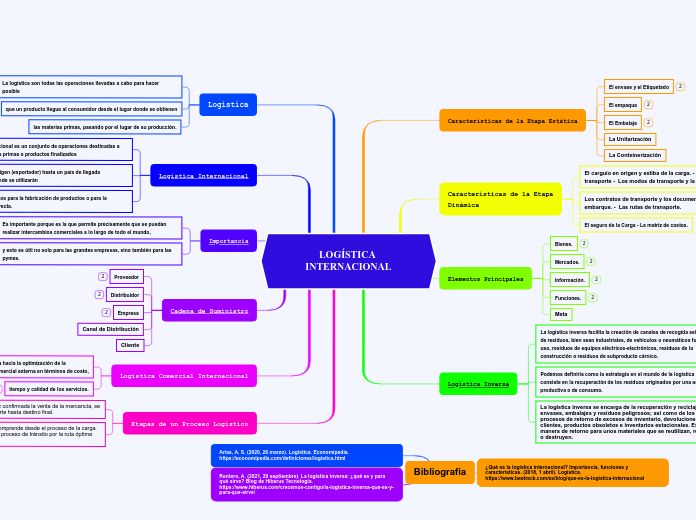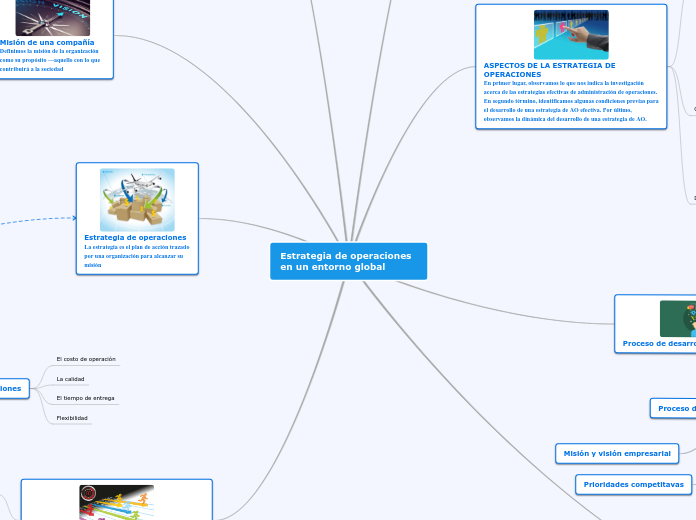Bibliografía
Rentero, A. (2021, 29 septiembre). La logística inversa: ¿qué es y para qué sirve? Blog de Hiberus Tecnología. https://www.hiberus.com/crecemos-contigo/la-logistica-inversa-que-es-y-para-que-sirve/
Arias, A. S. (2020, 26 marzo). Logística. Economipedia. https://economipedia.com/definiciones/logistica.html
¿Qué es la logística internacional? Importancia, funciones y características. (2018, 1 abril). Logística. https://www.beetrack.com/es/blog/que-es-la-logistica-internacional
LOGÍSTICA INTERNACIONAL
The part of speech is a category to which a word is assigned according to its syntactic functions. In English the main parts of speech are noun, pronoun, adjective, determiner, verb, adverb, preposition, conjunction, and interjection.
Etapas de un Proceso Logístico
A verb is an action word or 'doing' word that signifies movement in some way.
LA ETAPA DINÁMICA.- Que comprende desde el proceso de la carga de la mercancía en origen y el proceso de tránsito por la ruta óptima elegida.
A linking verb connects the subject with a word that gives information about the subject, such as a condition or relationship.
You look exhausted after studying all night.
LA ETAPA ESTÁTICA.- Una vez confirmada la venta de la mercancía, se debe prepararla para el transporte hasta destino final.
A verb with its own meaning: a verb that is not an auxiliary verb.
They have it.
Logística Comercial Internacional
A conjunction is a word like 'if' 'but' or 'and' which is used to connect sentences or clauses together.
tiempo y calidad de los servicios.
Subordinating conjunctions are conjunctions that are used at the beginning of subordinate clauses. Some examples of these conjunctions are: although, after, before, because, how, if, once, since, so that, until, unless, when etc.
Although it was raining, I went out.
Etapa orientada hacia la optimización de la
transacción comercial externa en términos de costo,
Coordinating conjunctions always connect phrases, words, and clauses. They are: for, and, nor, but, or, yet, so.
This stew is savory and delicious.
Cadena de Suministro
A preposition is one of the most exciting parts of grammar. A preposition is used to describe the location of something in relation to something else.
Cliente
Canal de Distribución
Empresa
When a preposition consists of more than one word, it is called double preposition.
into, within, upto etc.
Distribuidor
Compound preposition consists of two or more words.
on behalf of, according to, in front of, from across, etc.
Proveedor
When a preposition consists of one word it is called single or simple preposition.
in, at, on, to for, of, from, up, after, over, under, with, etc.
Importancia
An interjection is used to express emotion in a sentence.
Think of other interjections!
y esto es útil no solo para las grandes empresas, sino también para las pymes.
Es importante porque es la que permite precisamente que se puedan realizar intercambios comerciales a lo largo de todo el mundo,
Logística Internacional
An adverb is used to describe a verb, but it can also describe an adjective or another adverb.
Adverbs normally help paint a fuller picture by describing how something happens.
los recursos recibidos para la fabricación de productos o para la comercialización directa.
Just, Afterward, Soon, Currently
desde un país de origen (exportador) hasta un país de llegada (importador), en donde se utilizarán
Always, usually, Never
La logística internacional es un conjunto de operaciones destinadas a transportar materias primas o productos finalizados
Carefully, Slowly
Logística
A numeral is a word or phrase that describes a numerical quantity.
Some theories of grammar use the word 'numeral' to refer to cardinal numbers that act as a determiner to specify the quantity of a noun, for example the 'two' in 'two hats'.
las materias primas, pasando por el lugar de su producción.
que un producto llegue al consumidor desde el lugar donde se obtienen
One, two..
La logística son todas las operaciones llevadas a cabo para hacer posible
First, second..
Logística Inversa
An article is a word used to modify a noun, which is a person, place, object, or idea. Technically, an article is an adjective, which is any word that modifies a noun.
La logística inversa se encarga de la recuperación y reciclaje de envases, embalajes y residuos peligrosos; así como de los procesos de retorno de excesos de inventario, devoluciones de clientes, productos obsoletos e inventarios estacionales. Es una manera de retorno para unos materiales que se reutilizan, reciclan o destruyen.
Podemos definirla como la estrategia en el mundo de la logística que consiste en la recuperación de los residuos originados por una actividad productiva o de consumo.
Indefinite articles are the words 'a' and 'an.' Each of these articles is used to refer to a noun, but the noun being referred to is not a specific person, place, object, or idea. It can be any noun from a group of nouns.
A car in the parking lot.
La logística inversa facilita la creación de canales de recogida selectiva de residuos, bien sean industriales, de vehículos o neumáticos fuera de uso, residuos de equipos eléctricos-electrónicos, residuos de la construcción o residuos de subproducto cárnico.
It refers directly to a specific noun or groups of nouns.
The breakfast on my plate.
Elementos Principales
A pronoun is a word that can be used in place of a noun, typically after the noun itself has already been stated.
Meta
Funciones.
A reflexive pronoun ends with ...self or ...selves and refers to another noun or pronoun in the sentence (usually the subject of the sentence). The reflexive pronouns are myself, yourself, herself, himself, itself, ourselves, yourselves, and themselves.
Itself, Himself
Información.
Demonstrative pronouns are used to demonstrate (or indicate). This, that, these, and those are all demonstrative pronouns.
This, These
Mercados.
Possessive pronouns are used to show possession. The possessive pronouns are mine, yours, his, hers, ours, and theirs.
His, Your
Bienes.
The personal pronouns are I, you, he, she, it, we, they. More often than not (but certainly not always), they replace nouns representing people.
He, They
Características de la Etapa
Dinámica
An adjective is a word that's used to describe a specific noun and to provide more detail to the listener.
El seguro de la Carga - La matriz de costos.
Los contratos de transporte y los documentos de
embarque. - Las rutas de transporte.
Superlative adjectives demonstrate a higher level of comparison between entities.
She is the prettiest princess.
El carguío en origen y estiba de la carga. - Las características del transporte - Los modos de transporte y la interface.
Expresses a comparison between two entities or groups of entities in quality or degree.
He is taller than she is.
Características de la Etapa Estática
A noun is defined as a person, place, thing or idea. Proper nouns always begin with a capital letter. Common nouns, which are general words, such as 'cars,' are not capitalized.
La Conteinerización
La Unitarización
El Embalaje
A noun which refers to a group of things/people.
Family, Class
El empaque
Countable nouns are nouns that can be counted, even if the number might be extraordinarily high.
Uncountable nouns are nouns that come in a state or quantity which is impossible to count; liquids are uncountable, as are things which act
like liquids.
Cats, Rain
El envase y el Etiquetado
Proper nouns are the names of specific people or places. They should always begin with a capital letter.
Create sentences
Mary, Paris









